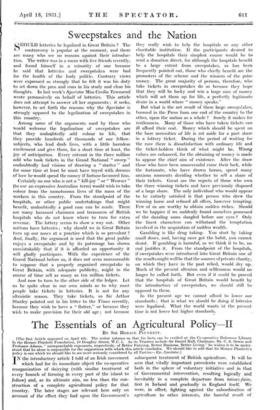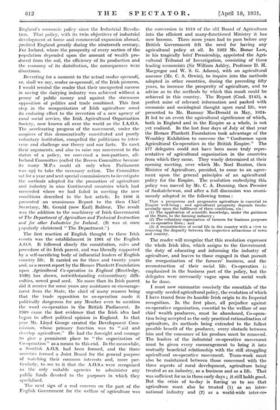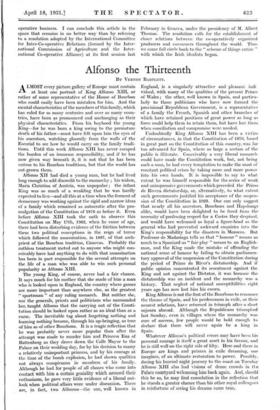The Essentials of an Agricultural Policy II
BY SIR HORACE PLUNKETT.
[The first Article appeared on April 4th. The writer informs us that his facts can be verified at the Co-operative Reference Library in the Horace Plunkett Foundation, 10 Doughty Street, W.C. 1. As its Trustees include Sir Daniel Hall, Chairman, Mr. C. S. Orwin and Professor Adams, " unimpeachable exponents, respectively, of Better Farming, Better Business, Better Living," he wishes it to be under- stood that he alone is responsible for the suggestions with which this article concludes. We should like to add that Sir Horace Plunkett's policy is one which we should like to see more seriously considered by all Parties.—En. Spectator.] England's economic policy since the Industrial Revolu- tion. That policy, with its twin objectives of industrial development at home and commercial expanSion abroad, profited England greatly during the nineteenth century. For Ireland, where the prosperity of every section of the population depended upon the amount of wealth pro- duced from the soil, the efficiency of its production and the economy of its distribution, the consequences were disastrous.
Reverting for a moment to the actual modus operandi, or, shall we say, modus co-operandi, of the Irish pioneers, I would remind the reader that their unexpected success in saving the dairying industry was achieved without a penny of public money and against the strenuous opposition of politics and trade combined. This first step in the reorganization of Irish agriculture owed its enduring effect to the invention of a new agency of rural social service, the Irish Agricultural Organization Society, now known all over the world as the I.A.O.S. The accelerating progress of the movement, under the auspices of this democratically constituted and purely voluntary institution, compelled the politicians to inter- vene and challenge our theory and our facts. To meet their arguments, and also to raise our movement to the status of a policy, we convened a non-partisan, all- Ireland Committee (called the Recess Committee because its many M.P.s could sit only when Parliament was up) to take the necessary action. The Committee sat for a year and sent special commissioners to investigate the methods adopted for the promotion of agriculture and industry in nine Continental countries which had succeeded where we had failed in meeting the new conditions described in the last article. In 1896 it presented an unanimous Report to the then Chief Secretary, Mr. Gerald (now Earl) Balfour. The result was the addition to the machinery of Irish Government of The Department of Agriculture and Technical Instruction and for other Industries for Ireland. (It was at once Fopularly christened " The Department.") The first reaction of English thought to these Irish events was the establishment in 1901 of the English A.O.S. It followed closely the constitution, rules and procedure of its Irish parent, and was liberally supported by a self-sacrificing body of influential leaders of English country life. It carried on for three and twenty years and, as` a recent report by the Horace Plunkett Foundation upon Agricultural Co-operation in England (Routledge, 1930) has shown, notwithstanding extraordinary diffi- culties, sowed good seed. No more than its Irish parent did it receive for some years any assistance or encourage- ment from the State, the chief of many reasons being that the trade opposition to co-operation made it politically dangerous for any Member even to mention the word co-operation in the British Parliament. In 1909 came the first evidence that the Irish idea had begun to affect political opinion in England. In that year Mr. Lloyd George created the Development Com- mission, whose primary function was to " aid and develop agriculture." He had the foresight and courage to give a prominent place to " the organization of Co-operation " as a means to this end. In the meanwhile, a Scottish A.O.S. had been formed, and the three societies formed a Joint Board for the general purpose .of watching their common interests and, more par- ticularly, to see to it that the A.O.S.s were recognized as the only suitable agencies to administer any public funds devoted to the purposes in which they specialized.
The next sign of a real concern on the part of the English Government for the welfare of agriculture was the conversion in 1919 of the old Board of Agriculture into the efficient and many-functioned Ministry it has now become. Three more years had to pass before any British Government felt the need for having any agricultural policy at all. In 1922 Mr. Boner Law, in his tragically brief Premiership, appointed the Agri- cultural Tribunal of Investigation, consisting of three leading economists (Sir William Ashley, Professor D. H. Macgregor and W. S. G. Adams), with an agricultural assessor (Mr. C. S. Orwin), to inquire into the methods adopted in other countries, during the preceding fifty years, to increase the prosperity of agriculture, and to advise as to the methods by which this result could be achieved in this country. The Report (Cmd. 2145), a perfect mine of relevant information and packed with economic and sociological thought upon rural life, was presented to Mr. Ramsay. MacDonald in May, 1924. It led to an event the agricultural significance of which, both in England and in the Empire as a whole, is not yet realized. In the last four days of July of that year the Hob:tee Plunkett Foundation took advantage of the Wembley Exhibition to convene the " Conference upon Agricultural Co-operation in the British Empire." The 177 delegates could not have been more truly repre- sentative of agricultural organization in the countries from which they came. They wisely determined at their opening meeting, over which Mr. Noel Buxton, then Minister of Agriculture,. presided, to come to an agree- ment upon the general principles of an agricultural policy for the Empire. The resolution embodying this policy was moved by Mr. C. A. Dunning, then Premier of Saskatchewan, and after a full discussion was unani- mously adopted in the following terms :
That a prosperous and progressive agriculture is essential to Empire well-being ; and agricultural prosperity depends funda- mentally upon the fulfilment of three conditions, viz : (1) The application of scientific knowledge, under the guidance of the State, to the farming industry ; (2) The voluntary organization of farmers for business purposes on co-operative lines ; and (3) A reconstruction of social life in the country with a view to removing the disparity between the respective attractions of town and country.
The reader will recognize that this resolution expresses the whole Irish idea, which assigns to the Government the duty of educating and informing the industry of agriculture, and leaves to those engaged in that pursuit the reorganization of the farmers' business, and the reconstruction of their social life. Co-operation b emphasized in the business part of the policy, but the delegates were necessarily vague upon the social work to be done.
I must now summarize concisely the essentials of the urgently needed agricultural policy, the evolution of which I have traced from its humble Irish origin to its Imperial recognition. In the first place, all prejudice against co-operative organization, essential to the welfare of our chief wealth producers, must be abandoned, Co-opera= tion being accepted as the only practical rationalization of agriculture, its methods being extended to the fullest possible benefit of the producer, every obstacle between him and the consumer of his produce must be removed. The leaders of the industrial co-operative movement must be given every encouragement to bring it into mutually beneficial relationship with the still struggling agricultural co-operative movement. Team-work must also be maintained between those concerned with the three aspects of rural development, agriculture being treated as an industry, as a business and as a life. That was sufficient for us in those early days k it still holds good. But the crisis of to-day is forcing us to see that agriculture must also be treated (1) as an inter- national industry and (2) as a world-wide inter-co. operative business. I can conclude this article in the space that remains in no better way than by referring to a resolution adopted by the International Committee for Inter-Co-operative Relations (formed by the Inter- national Commission of Agriculture and the Inter- . national Co-operative Alliance) at its fast session last February in Geneva, under the presidency of M. Albert Thomas. The resolution calls for the establishment of closer relations between the co-operatively organized producers and consumers throughout the world. Thus we come full circle back to the " scheme of things entire " with which the Irish idealists began.
















































 Previous page
Previous page